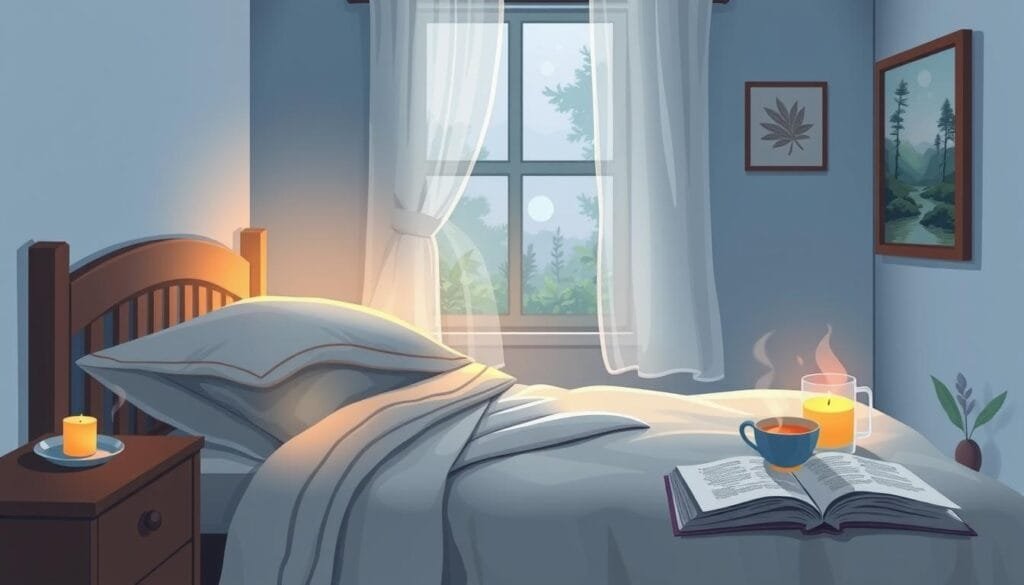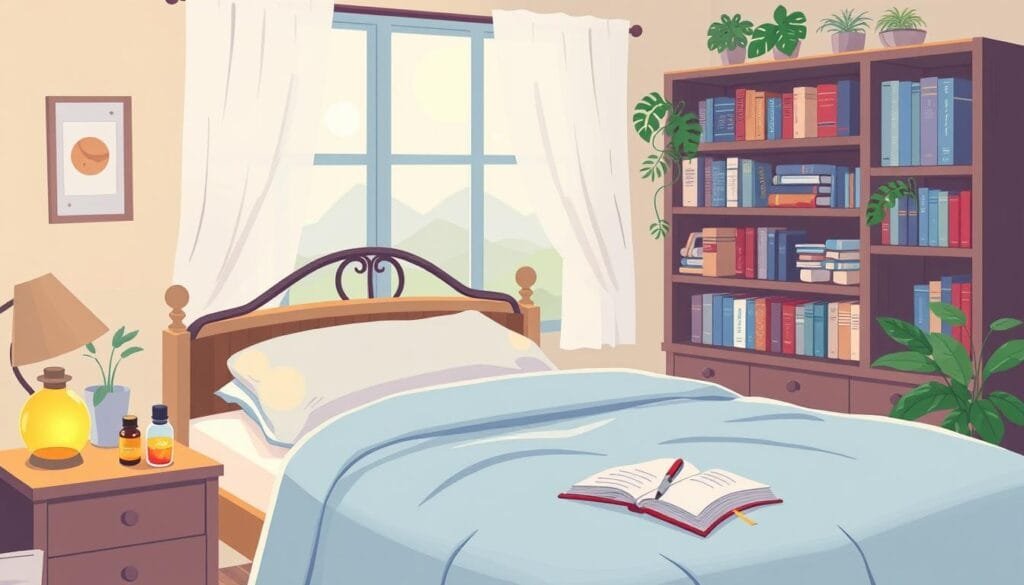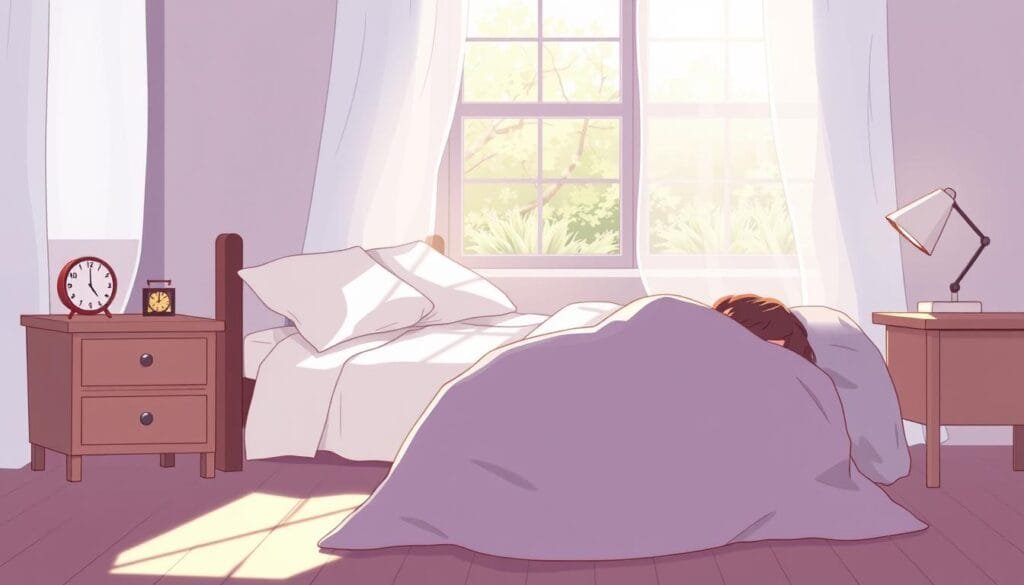As the sun sets, our bodies start to crave sleep. But for many, getting good sleep is a daily struggle. The solution? By following the best sleep hygiene practices, you can get the rest you need and feel better overall.
Key Takeaways
- Consistent sleep schedule and fixed wake-up time are crucial for quality sleep
- Creating a relaxing bedtime routine can help you fall asleep more easily
- Optimizing your sleep environment by controlling light, temperature, and noise can improve sleep quality
- Adopting healthy daytime habits like regular exercise and managing stress can promote better sleep
- Seeking professional help if you experience persistent sleep issues is recommended
What is Sleep Hygiene?
Sleep hygiene refers to the habits and environment that help you sleep better. It includes your sleep environment, like your bedroom’s comfort and temperature. It also covers your sleep habits and bedtime routines.
Sleep Hygiene Encompasses Environment and Habits
Your sleep environment is key to falling and staying asleep. Things like lighting, temperature, and noise affect your sleep quality. So does the comfort of your bedding.
Your sleep habits also matter. This includes your sleep schedule, pre-bedtime activities, and daytime behaviors. These habits can greatly impact your sleep.
Optimizing Sleep Hygiene for Better Sleep
Improving your sleep hygiene can make your sleep environment better. It also helps you develop healthy sleep habits. This leads to more consistent and restful sleep, which is vital for your health.
“Good sleep hygiene is key to getting the high-quality, restorative sleep your body needs to function at its best.”
Why Good Sleep Hygiene Matters
Good sleep hygiene is key for your health and happiness. It helps you fall asleep faster, stay asleep longer, and sleep more deeply. This leads to more energy during the day, a better mood, and a stronger immune system.
It also reduces stress, improves brain function, and helps control blood sugar. Taking care of your sleep habits is important.
Consequences of Poor Sleep
Ignoring sleep hygiene can harm your health. Not getting enough sleep can lead to serious problems like type 2 diabetes and heart disease. It can also cause high blood pressure and stroke.
Poor sleep can make you less focused, less productive, and more likely to have accidents. It’s a big risk for your safety and well-being.
Sleep as a Public Health Strategy
Seeing sleep hygiene as a public health issue is vital. The Centers for Disease Control and Prevention (CDC) tracks sleep problems in adults across the country. They show how common sleep issues are in the U.S.
By teaching people about good sleep habits, we can tackle this big health problem. This includes keeping a regular sleep schedule, making your sleep area quiet, and avoiding screens before bed. It’s a way to improve health for everyone.
“Healthy sleep is essential for physical and mental well-being. By prioritizing good sleep hygiene, you can unlock a range of benefits that positively impact your daily life.”
Maintain a Consistent Sleep Schedule
Keeping a regular sleep schedule is key for good sleep habits. Waking up at the same time every day helps your body adjust. It also makes sleep a priority, helping you get enough rest each night.
Have a Fixed Wake-Up Time
Adults need at least seven hours of sleep each night. Most don’t need more than eight hours to feel rested. Waking up at the same time every day helps your body stay in rhythm.
Prioritize Sleep
Make sleep a top priority in your daily life. Don’t let other activities cut into your sleep time. Getting at least seven hours of sleep each night is important for your health.
“Consistency is key for a healthy sleep routine, with bedtime and wake-up time staying consistent, providing at least seven hours of sleep each night, and aligning as closely with day and night as lifestyle allows.”
By sticking to a consistent sleep schedule and making sleep a priority, you improve your sleep quality. This can also lower your risk of health problems like heart disease and depression.
Establish a Relaxing Bedtime Routine
Creating a relaxing bedtime routine gets your body and mind ready for sleep. Start with calming activities like a warm bath, light stretching, or reading. These should happen 30-60 minutes before bed. A regular pre-bed activities helps your mind know it’s time to sleep.
A study shows that a bedtime routine is key for good sleep. Experts say to do the same activities every night, 30 to 60 minutes before bed.
For example, a warm bath can make you feel sleepy by lowering your body temperature. Reading in a soft light outside your bedroom is good for adults. Writing in a journal or making a to-do list can also help you fall asleep faster.
It’s also important to make your bedroom sleep-friendly. Keep the room cool, quiet, and clutter-free. Dr. David Rosen says knowing and following a bedtime routine is key.
Relaxation techniques like deep breathing and yoga can also help you sleep better. Soothing sounds, like music or white noise, can help you relax and fall asleep.
“A bedtime routine is essential for promoting healthy sleep habits. By engaging in a consistent series of calming activities, you can signal to your body and mind that it’s time to wind down and prepare for a restful night’s sleep.”
best sleep hygiene practices
Getting quality sleep is key for your health and happiness. Two top ways to improve sleep are to avoid light and electronics before bed. Also, add relaxation techniques to your evening routine.
Limit Light and Electronic Exposure
Electronic devices like phones and computers give off blue light. This light can mess with your body’s sleep hormone, melatonin. To sleep better, stop using these devices an hour before bed. Try reading, taking a warm bath, or doing light stretches to relax.
Test Relaxation Methods
Adding relaxation to your bedtime can calm your mind and body. Try different methods like:
- Mindful meditation
- Gentle yoga or stretching
- Paced breathing exercises
- Listening to soothing music
Find what works for you and do it every night. Regular relaxation can greatly improve your sleep.
Good sleep hygiene is crucial for your health. By avoiding light and electronics and using relaxation, you’ll sleep better. You’ll wake up feeling refreshed and ready for the day.
Adopt Healthy Daytime Habits
Healthy habits during the day can greatly improve your sleep. Simple practices in your daily routine can help your body adjust to a natural sleep cycle. This way, you wake up feeling refreshed and ready to go.
Get Daylight Exposure
Daylight, especially in the morning, is key for your body’s rhythm. Sunlight tells your body to make less melatonin, the sleep hormone. Spend at least 30 minutes outside or near a window to keep your body in sync.
Be Physically Active
Exercise can make your sleep better. Do at least 30 minutes of moderate activity, like brisk walking or swimming, in the day. This helps you sleep faster and better, but avoid intense workouts before bed.
| Healthy Daytime Habits | Benefits |
|---|---|
| Daylight Exposure | Regulates circadian rhythm, reduces melatonin production |
| Physical Activity | Improves sleep quality, helps fall asleep faster |
Adding these habits to your day can help your sleep. Remember, being consistent is important. Try to make these habits a regular part of your life.
Optimize Your Sleep Environment
Creating a great sleep environment is key for good sleep habits. Make sure your bedding is comfy and fits your style. Also, keep the bedroom’s temperature, light, and noise just right. These steps help make your bedroom a cozy place for sleep.
Use Comfortable Bedding
The right mattress and pillows are crucial for good sleep. Choose a mattress that supports your body well. Try out different pillows to find the perfect comfort and support for you.
Control Temperature, Light, and Noise
Right temperature, light, and noise levels are important for sleep. Keep your room cool, around 65-68 degrees Fahrenheit. Use blackout curtains or an eye mask to block light. For noise, white noise or earplugs can help.
| Optimal Sleep Environment Factors | Recommended Settings |
|---|---|
| Temperature | 65-68 degrees Fahrenheit |
| Light | Minimal, using blackout curtains or an eye mask |
| Noise | Controlled, using white noise or earplugs |
By making your sleep space comfy and controlling the environment, you’ll sleep better. This creates a cozy spot for restful sleep.
Personalize Your Sleep Hygiene
Good sleep hygiene is key, but what works for you might not work for others. It’s important to try different habits and settings to find what works best for your sleep. Look for what helps you fall asleep, stay asleep, and wake up feeling refreshed.
To make your sleep better, try these ideas:
- Keep a regular sleep schedule. Experts say sticking to a sleep-wake cycle within 20 minutes is vital for good sleep.
- Make your bedroom sleep-friendly. Aim for a cool room, and experiment with light, noise, and bedding to find your perfect sleep setup.
- Control your light exposure. Natural light during the day helps your body clock, while avoiding bright screens at night boosts melatonin and sleep quality.
- Try relaxation techniques. Meditation, deep breathing, or progressive muscle relaxation can help you relax and sleep better.
- Watch your daytime activities. Exercise and daylight are good, but avoid stimulants and big meals before bed.
It’s all about listening to your body and finding what works for you. By trying different things, you can create a sleep routine that leaves you feeling refreshed and ready for the day.
| Sleep Hygiene Factors | Recommendations |
|---|---|
| Sleep Schedule | Maintain a consistent sleep-wake cycle, within a 20-minute range, as suggested by 80% of sleep specialists. |
| Sleep Environment | Aim for a bedroom temperature around 65 degrees Fahrenheit, as studies suggest this is most conducive to restful sleep. |
| Light Exposure | Seek out natural light during the day to regulate your circadian rhythm, and avoid bright light from electronics at night to maintain melatonin production. |
| Relaxation Techniques | Experiment with methods like meditation, deep breathing, or progressive muscle relaxation to find what helps you unwind and transition to sleep more easily. |
| Daytime Habits | Engage in regular exercise and avoid stimulants, large meals, and alcohol close to bedtime. |
“The key to personalized sleep hygiene is being attuned to your body’s unique needs and preferences. By experimenting with various strategies, you can develop a sleep routine that helps you feel rested, rejuvenated, and ready to tackle the day.”
Avoid Stimulants Before Bed
Getting a good night’s sleep is key for your health. It’s important to avoid stimulants before bed. Caffeine and nicotine can make it hard to fall and stay asleep.
Reduce Caffeine and Nicotine
Caffeine is a big sleep disruptor. It’s in coffee, tea, soft drinks, and some meds. To sleep well, avoid caffeine in the late afternoon and evening.
Nicotine from cigarettes or vaping also keeps you awake. So, cut down on nicotine use before bed.
Limit Alcohol Consumption
Alcohol might make you sleepy at first. But it can mess with your sleep later. It breaks down fast, causing poor sleep quality.
To sleep better, drink less alcohol, especially before bed.
Staying away from caffeine, nicotine, and alcohol before bed helps you sleep better. This improves your health and well-being.
“Caffeine and nicotine are powerful stimulants that can keep your body and mind alert, making it harder to fall asleep and stay asleep. Limiting their consumption, especially in the evening, is a key part of good sleep hygiene.”
Don’t Eat Large Meals Before Bedtime
Eating big, heavy, or spicy meals before bed can mess with your sleep. The digestion process can be a problem, causing acid reflux. This can really disrupt your sleep. It’s better to have light snacks or meals late at night.
Studies show that eating small, nutritious foods at night can be good. Foods with tryptophan, serotonin, or melatonin might help you sleep faster. But, eating a big meal close to bedtime can make it harder to fall asleep and wake you up during the night.
To keep your sleep healthy, stop eating three hours before bed. This lets your body digest food without interrupting your sleep. If you need a snack, choose something like veggies with hummus, an apple with peanut butter, or a small Greek yogurt.
Avoiding large meals before bed can contribute to better sleep quality and overall health.
“Consuming a small, nutrient-rich snack near bedtime may be advisable for managing blood sugar levels, but heavy, high-calorie meals should be avoided.”
Avoid In-Bed Activities
To get better sleep, it’s key to not use your bed for anything but sleep and intimacy. Doing work, reading, or watching TV in bed messes with your brain. It makes it hard to see your bed as a place for rest.
Make your bed just for sleep and sex. This helps your brain link your bed with rest. It makes falling asleep easier and improves your sleep quality.
Here are some tips to help:
- Don’t use laptops, phones, or other devices in bed. The blue light they give off can mess with your sleep cycle.
- Work or read in a different room, not your bedroom.
- Have a calming bedtime routine. Try light stretching, deep breathing, or meditation.
By always linking your bed with sleep, you train your brain. It sees your bed as a place for rest and relaxation. This leads to better and more uninterrupted sleep.
“Use your bed for sleep and sex only. That’s it. Nothing else.”
Good sleep hygiene is crucial for better sleep and feeling good during the day. Remember, your bed should be a place for rest, not work or entertainment.
Don’t Stay Awake in Bed
If you can’t fall asleep in 20 minutes, get up and do something calm. This helps your body learn that bed is for sleep, not staying awake. This makes it easier to fall asleep later.
Keeping a regular sleep schedule is crucial. Sleep experts say to go to bed and wake up at the same time every day. But, it’s hard because of our busy lives.
To avoid staying awake in bed, make a relaxing bedtime routine. Keep your bedroom cool, dark, and quiet. Try deep breathing or meditation to relax.
The bed should only be for sleeping. If you can’t sleep, get out of bed and wait until you’re tired again. With practice, you’ll learn to see your bed as a place for rest.
“Crafting sustainable and beneficial routines makes healthy behaviors feel almost automatic, creating an ongoing process of positive reinforcement.”
Creating a sleep-friendly environment and routine is key to a healthy life. By fixing the don’t stay awake in bed problem, you can sleep better and feel more alert during the day.
Manage Stress and Anxiety
Stress and anxiety can make it hard to sleep well. But, you can use journaling and relaxation techniques to help. These can improve your sleep habits.
Journaling and Planning
Writing down your thoughts and worries can clear your mind before bed. This “brain dumping” can stop your mind from racing. Take a few minutes each night to think about your day and plan for tomorrow.
This can help you feel less anxious and more calm.
Relaxation Techniques
Practices like meditation, deep breathing, or progressive muscle relaxation can also help. They calm your mind and body, making it easier to sleep. Try different methods to see what works best for you.
| Relaxation Technique | Benefits |
|---|---|
| Meditation | Reduces stress and anxiety, promotes focus and mindfulness |
| Deep Breathing | Lowers blood pressure, slows heart rate, and induces relaxation |
| Progressive Muscle Relaxation | Releases physical tension and stress in the body |
Managing stress and anxiety is key for good sleep. By adding these strategies to your daily life, you can make your sleep space more relaxing. This helps prepare your mind and body for a good night’s sleep.
Limit Napping
Napping can help you feel less tired, more alert, and happier. But, it’s important to nap for the right amount of time and at the right time. This helps keep your sleep schedule regular and prevents it from messing up your nighttime sleep.
The National Sleep Foundation says naps should be short, about 20 minutes or less. This way, you won’t feel confused or tired when you wake up. The best time for a nap is usually in the early afternoon. Napping too late can make it hard to fall asleep at night.
To make your naps helpful without hurting your nighttime sleep, nap in a quiet, dark, and comfy spot. Make sure you wake up fully before you start doing things that need quick thinking.
By limiting napping and following good sleep habits, you can sleep better and wake up feeling great. Remember, a regular sleep schedule and a calm bedtime routine are key to getting good sleep.
“Napping can be a powerful tool for enhancing productivity and well-being, but it’s important to strike the right balance to avoid disrupting your overall sleep pattern.”
Exercise Regularly, But Not Too Late
Regular physical activity can improve your sleep quality. However, it’s key to exercise at the right time. Exercising too close to bedtime can be too stimulating and make it hard to fall asleep.
It’s best to avoid vigorous exercise 2-3 hours before bedtime. This helps keep your body’s natural sleep-wake cycle in check. Increased energy and body temperature can disrupt your sleep.
Studies show that proper exercise can help with sleep issues. It can also lower disease risks and improve your quality of life. Adults who exercise moderately to vigorously can sleep better by falling asleep faster and staying asleep longer.
But, exercising before bed can impact your sleep quality. Vigorous workouts near bedtime can affect your sleep efficiency and total sleep time. People who exercise in the evening might sleep more soundly but have less efficient sleep after intense workouts.
- Aim for 30 minutes or more of aerobic exercise during the day to improve your sleep quality.
- Avoid vigorous exercise within 2-3 hours of your target bedtime to prevent disrupting your natural sleep-wake cycle.
- Experiment with different exercise timing and types to find what works best for your individual sleep needs.
By adding regular exercise to your daily routine, but timing it right, you can enjoy better sleep and overall health.
Seek Professional Help if Needed
If you’re still having trouble sleeping, even with good sleep hygiene practices, it’s time to see a doctor. A primary care physician or sleep medicine specialist can help. They can find out what’s causing your sleep problems and suggest treatments.
It’s key to get help if sleep issues last more than 6-8 weeks. Good sleep routines can help, but if they don’t work, an expert’s advice is vital.
Things like work, stress, or health issues can mess with your sleep. A doctor can figure out what’s going on and create a plan just for you. For example, people with Post-Traumatic Stress Disorder (PTSD) might need special help to sleep better.
Getting help for sleep problems shows you care about your health. It’s a step towards feeling better. If you’re still having trouble sleeping, don’t wait to ask for help.
Conclusion
Improving your sleep quality is possible with the right habits. Start by setting a regular sleep schedule and creating a calming bedtime routine. Make sure your sleep space is comfortable and dark.
Also, stay active during the day and manage stress. Good sleep habits are all about finding what works for you. Experiment with different methods to find your best sleep routine.
Good sleep is key to feeling your best. The CDC says many Americans don’t get enough sleep. By following the tips in this article, you can improve your sleep and enjoy better health.
Remember, sleep habits should fit your unique needs. Customize your approach to achieve lasting results. Focus on finding the sleep strategies that suit you best and make sleep a priority for your well-being.
FAQ
What is sleep hygiene?
Why is good sleep hygiene important?
How can I maintain a consistent sleep schedule?
What are some best sleep hygiene practices?
How can I optimize my sleep environment?
How can I manage stress and anxiety to improve my sleep?
When should I seek professional help for sleep issues?
Source Links
- Mastering Sleep Hygiene: Your Path to Quality Sleep – https://www.sleepfoundation.org/sleep-hygiene
- 12 Tips for Better Sleep Hygiene – https://www.healthline.com/health/sleep-hygiene
- Sleep Hygiene Tips for a Better Night’s Rest – https://health.clevelandclinic.org/sleep-hygiene
- What Is Sleep Hygiene? – https://www.verywellmind.com/what-is-sleep-hygiene-5085887
- The Role of Sleep Hygiene in Promoting Public Health: A Review of Empirical Evidence – https://www.ncbi.nlm.nih.gov/pmc/articles/PMC4400203/
- Sleep hygiene: Tips and habits checklist – https://www.medicalnewstoday.com/articles/sleep-hygiene
- Why Is Sleep Hygiene Important? – Baptist Health – https://www.baptisthealth.com/blog/health-and-wellness/why-is-sleep-hygiene-important
- About Sleep – https://www.cdc.gov/sleep/about/index.html
- Better sleep hygiene: The key to a good night’s rest – https://www.healthpartners.com/blog/sleep-hygiene/
- 6 steps to better sleep – https://www.mayoclinic.org/healthy-lifestyle/adult-health/in-depth/sleep/art-20048379
- How to Fix Your Sleep Schedule – https://www.sleepfoundation.org/sleep-hygiene/how-to-reset-your-sleep-routine
- Bedtime Routines for Adults – https://www.sleepfoundation.org/sleep-hygiene/bedtime-routine-for-adults
- 10 Steps to Design a Better Bedtime Routine – https://sleepdoctor.com/sleep-hygiene/bedtime-routine/
- Best Bedtime Routine For Good Sleep – Sleep Care Online – https://www.sleepcareonline.com/articles/ideal-bedtime-routine-for-adults/?srsltid=AfmBOooS5sbJpXnFbdQHO1rUIAtZX8CkgQWDLo4X7kwxGkC90zpvxYED
- 20 Tips for How to Sleep Better – https://www.sleepfoundation.org/sleep-hygiene/healthy-sleep-tips
- What Is Sleep Hygiene? – https://www.webmd.com/sleep-disorders/what-is-sleep-hygiene
- Sleep Hygiene: 9 Tips for Better Sleep – https://www.ncoa.org/adviser/sleep/sleep-hygiene/
- Healthy Sleep Habits – https://www.sleepfoundation.org/sleep-habits
- Healthy Sleep Habits – Sleep Education – https://sleepeducation.org/healthy-sleep/healthy-sleep-habits/
- 11 Healthy Habits to Sleep Better – https://www.healthhub.sg/live-healthy/overcoming_insomnia
- Sleep Hygiene: Good Sleep Habits – https://www.sleephealthfoundation.org.au/sleep-topics/sleep-hygiene-good-sleep-habits
- Sleep Hygiene and Best Practices – Neurology Solutions – https://www.neurologysolutions.com/sleep-hygiene-and-best-practices/
- How to Improve Sleep Hygiene: 12 Best Sleep Hygiene Tips – https://www.saatva.com/blog/sleep-hygiene/
- Sleep Hygiene Tips – Headspace – https://www.headspace.com/sleep/sleep-hygiene
- Sleep Hygiene Practices and Its Impact on Mental Health and Functional Performance Among Adults in Tabuk City: A Cross-Sectional Study – https://www.ncbi.nlm.nih.gov/pmc/articles/PMC10105495/
- Sleep Hygiene Checklist_REVISED_C.pdf – https://sdlab.fas.harvard.edu/files/sdlab/files/sleephygienecheckliststriveweekly.pdf
- Sleep disorders and problems (insomnia): Learn More – What can you do if you have trouble sleeping? – InformedHealth.org – https://www.ncbi.nlm.nih.gov/books/NBK279320/
- PDF – https://www.kadena.af.mil/Portals/40/documents/AFD-120724-091.pdf
- Is It Bad To Eat Before Bed? | Sleep Foundation – https://www.sleepfoundation.org/nutrition/is-it-bad-to-eat-before-bed
- Is Eating Before Bed Bad for You? – https://health.clevelandclinic.org/is-eating-before-bed-bad-for-you
- Sleep Information Sheet – 04 – Sleep Hygiene new – https://www.cci.health.wa.gov.au/~/media/CCI/Mental-Health-Professionals/Sleep/Sleep—Information-Sheets/Sleep-Information-Sheet—04—Sleep-Hygiene.pdf
- Sleep Hygiene Dos and Don’ts – https://sleeptreatmentoh.com/sleep-hygiene-dos-and-donts/
- Sleep Better with Less Stress – https://www.webmd.com/sleep-disorders/tips-reduce-stress
- How To Relieve Stress for Bedtime – https://www.sleepfoundation.org/sleep-hygiene/how-to-relieve-stress-for-bedtime
- Anxiety and Sleep – https://www.sleepfoundation.org/mental-health/anxiety-and-sleep
- How to get a great nap – https://www.mayoclinic.org/healthy-lifestyle/adult-health/in-depth/napping/art-20048319
- Sleep Hygiene: Tips and Techniques for a Better Night’s Sleep – https://www.joincurio.com/post/sleep-hygiene-tips-and-techniques-for-a-better-nights-sleep
- Exercise and Sleep – https://www.sleepfoundation.org/physical-activity/exercise-and-sleep
- The Connection Between Diet, Exercise, and Sleep – https://www.sleepfoundation.org/physical-health/diet-exercise-sleep
- Exercising for Better Sleep – https://www.hopkinsmedicine.org/health/wellness-and-prevention/exercising-for-better-sleep
- When and how do I seek help for my sleep? – https://www.sleephealthfoundation.org.au/news-and-articles/when-and-how-do-i-seek-help-for-my-sleep
- Sleep Like a Pro: 10 Game-Changing Tips for a Happier, Healthier Mind! | Maitri Path to Wellness, PLLC – https://maitripathtowellness.com/2023/06/02/sleep-hygiene-tips-improve-mental-health/
- Sleep Hygiene: Definition, Types, Techniques, Efficacy – https://www.verywellhealth.com/sleep-hygiene-definition-types-techniques-efficacy-6749577
- Sleep Hygiene Practices: Where to Now? – https://www.mdpi.com/2673-947X/2/3/13









